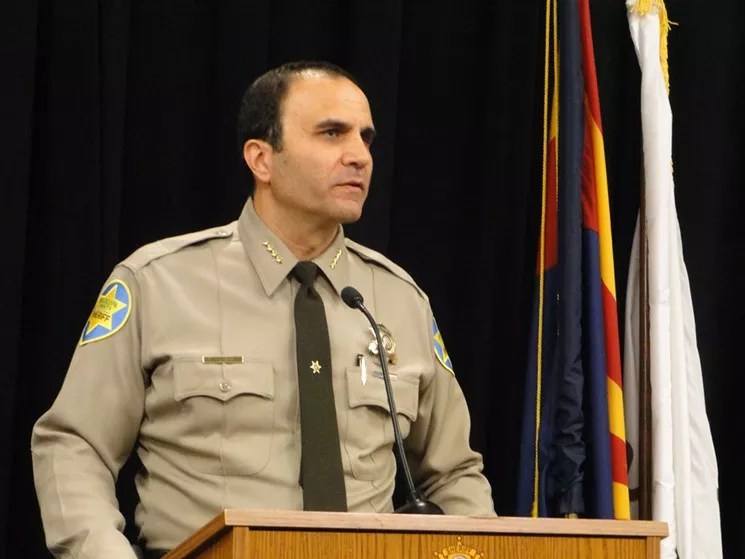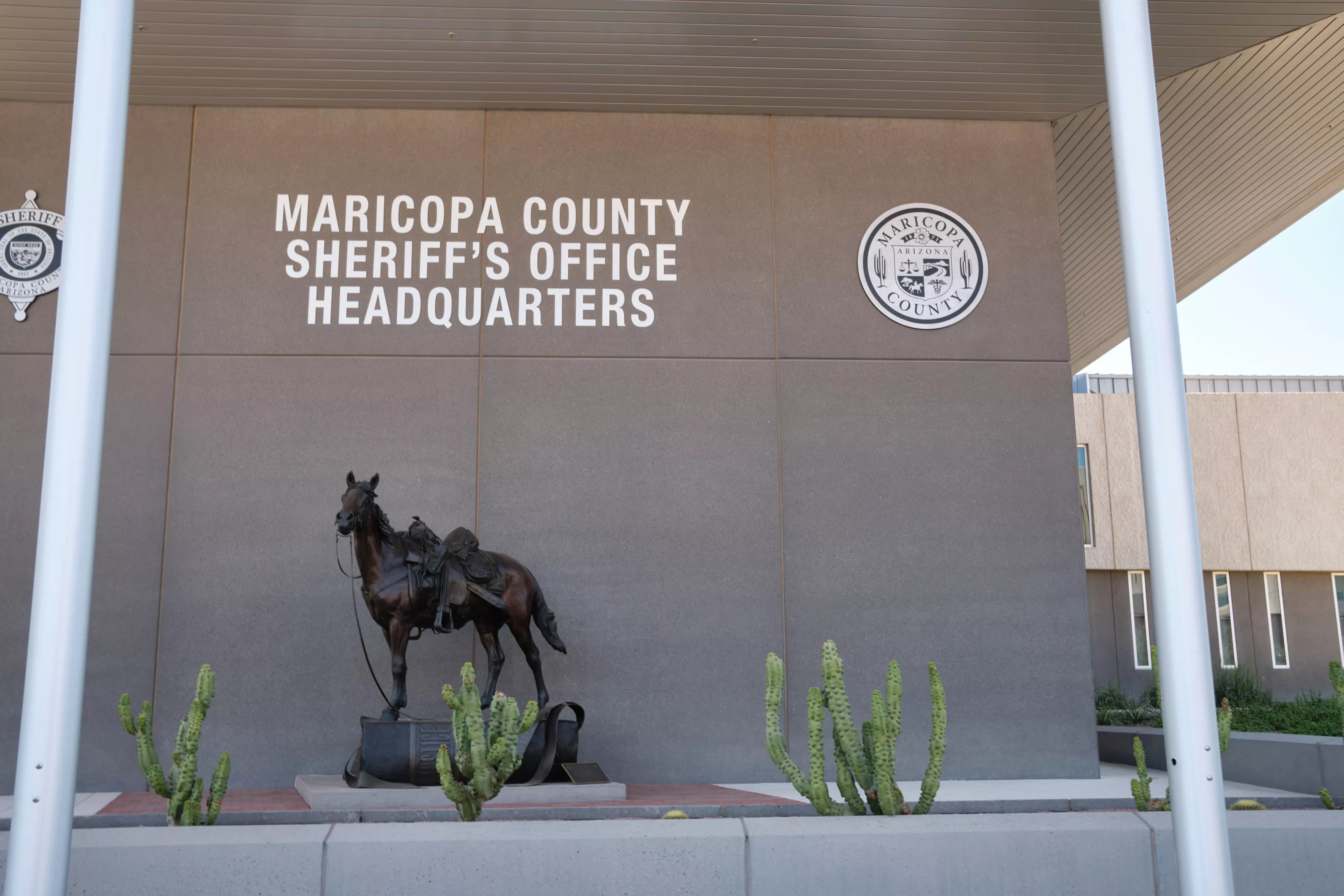
Sean Holstege

Audio By Carbonatix
Time is ticking for Maricopa County Sheriff Paul Penzone.
In a matter of weeks, U.S. District Court Judge G. Murray Snow plans to cite Penzone and the Maricopa County Sheriff’s Office for contempt of court over a 15-year-old racial profiling lawsuit that started under Penzone’s predecessor. The ongoing court case, Ortega Melendres v. Arpaio dates back to the reign of former Sheriff Joe Arpaio. In 2016, Arpaio was found in contempt of court orders in Melendres, as well.
The class-action lawsuit was initially brought in 2007 over MCSO’s racial profiling practices. After a 2011 injunction and a subsequent 2013 finding that Arpaio engaged in unlawful practices as sheriff, MCSO has been required to comply with a laundry list of court mandates.
But Penzone hasn’t fully complied with the orders. The reason for the looming contempt finding originates in the office’s internal investigations division, the Professional Standards Bureau, which investigates complaints about the conduct of deputies, detention officers, and other staff.
For years, the sheriff’s office has faced a severe backlog in processing these complaints. Despite a long-standing court mandate that all internal investigations must be completed in 85 days – and for certain divisions, within 60 days – the average time currently sits at more than 600 days per investigation. The agency has more than 2,100 open investigations. In 2021, the sheriff’s office initiated 1,172 misconduct allegations and 1,204 in 2020.
At a hearing in August, Snow announced his intention to hold Penzone in contempt over the backlog. The official order will likely be handed down sometime in the next several weeks.
The contempt order is significant. Maricopa County already spends millions as a result of the ongoing Melendres case: $29 million on compliance with the related court orders last year alone, according to county budget documents. That figure does not include attorneys’ fees and other court costs, an MCSO spokesperson confirmed to Phoenix New Times.
The contempt finding could allow the court to take further action, such as additional sanctions, to force MCSO into compliance. It’s also a blow to Penzone’s record after years of positioning himself as a reformer of the long-troubled sheriff’s office.
Christine Wee, senior staff attorney at the American Civil Liberties Union of Arizona, which is currently representing the plaintiffs in the suit, wrote in an email to New Times that she hoped the contempt finding would serve as an “impetus” for the sheriff to “realize, after more than five years, the importance of an efficient, competent and fair misconduct investigation system.”
Calbert Gillett, a spokesperson for the sheriff’s office, declined to comment on the matter. “Our position has been made clear in our pleadings in U.S. District Court regarding this issue,” Gillett said in a statement to New Times. Attorneys for the sheriff’s office have acknowledged that the sheriff’s office is out of compliance with the court orders and wrote in a recent filing that the agency has a “strong commitment to reduce its investigative backlog and complete timely internal investigations.”

The Maricopa County Sheriff’s Office faces a new contempt of court ruling in a 15-year-old lawsuit.
James Deak
‘It’s Just Completely Out of Hand’
The scope of MCSO’s investigation backlog – and its significance – can be seen in the agency’s monthly closed case reports, which provide a glimpse into the usually secretive workings of the internal affairs bureau. The reports include brief summaries of complaint investigations closed that month.
One case highlighted in a recent report started on July 13, 2017, when the office opened an investigation into an accusation that a sheriff’s deputy groped a subject during an arrest. It took the agency just shy of five years to complete its investigation before it was closed on June 7, 2022. In those five years, at least based on the short summary that was made public, investigators reviewed the body-worn camera footage from the incident and came up with no conclusions at all.
“The placement of the deputy’s body-worn camera did not show his hand movements during the search, therefore there was insufficient evidence to prove or disprove the deputy sexually assaulted the complainant,” according to the summary.
In some cases, though, the allegations were corroborated, but it took years for employees to face any discipline. In another case, a detention officer was accused of assaulting his wife. The accusation was ultimately sustained, and the employee was suspended. It took almost three years for the case to be closed.
In another case, an officer’s use of a stun gun on an inmate was ruled unjustified. A second officer was faulted for not intervening in the incident. All of this, according to the report, was captured on jail surveillance video, but it took more than two and a half years for any conclusion to be reached in the case or either of the officers to be disciplined.
“It’s just completely out of hand,” said Sylvia Herrera, a longtime community organizer in Phoenix. Herrera is a member of the Community Advisory Board, a five-member panel created under Melendres to review policies at the sheriff’s office and ensure dialogue between the sheriff and the public.
The relationship between the board and the sheriff has been tense lately, Herrera said. “There’s resistance. There’s not cooperation,” she noted. Often, she felt as though the board was treated like “a thorn on his side.”
For years, the board repeatedly reminded Penzone and agency leadership of the worsening backlog and of traffic stop reports that continued to show racial disparities in treatment of white and Hispanic drivers, Herrera said. But the backlog continued to grow.
On September 7, 2021, Snow appointed a “management expert” to investigate the backlog of complaints. That expert was Michael Gennaco, a California attorney who specializes in auditing law enforcement agencies. Gennaco spent the next several months studying the inner workings of the sheriff’s office.
He found that the case backlog had grown “exponentially” under Penzone’s watch. In 2018, per Gennaco’s work and prior reports by a court monitor in Melendres, cases took about 204 days for the investigation to be closed. That was more than double what was required by the court order. By the end of 2020, it took an average of 520 days to close an investigation. By 2021, that number had jumped to 663 days. In the first quarter of 2022, it had fallen slightly to 611.
For investigators, the workload is essentially “self-defeating,” Gennaco concluded. Investigators tasked to review complaints in the jails currently have an average of 76 cases open at any one time. The recommended number is about a dozen. One cause of this, Gennaco found, was that the number of investigators working in the internal affairs bureau had remained the same for four years – despite the office’s claims that it had bulked up staffing. As many as seven budgeted positions in the bureau have gone unfilled for years.
“While certainly the underpinnings of the multitude of constitutional violations identified in this case, including the wholesale corruption of the internal investigative process, lay at the feet of former Sheriff Arpaio, it has been over five years since Sheriff Penzone has been at the helm of MCSO,” Gennaco wrote in the report.
It was Penzone’s responsibility to address the problem, he continued.
Not only does the backlog impact accountability, it also affects worker morale. Two detention officers – one who currently works at the agency and another who recently left – told New Times that employees are frustrated by the backlog. The two spoke on a condition of anonymity because they are not authorized to speak to the media. Frivolous complaints – involving “the most absurd things in the world,” one officer said – can still take months or years to resolve.
The officer supported Snow’s plans to intervene in the affairs bureau but said that “for me and a lot of other officers, that doesn’t go far enough.” He wants to see the entire complaint process overhauled, he said.
New Oversight Role for Sheriff’s Office
Once Penzone is held in contempt, what comes next? Nearly 15 years into the Melendres case, after all, the court battles seem to show no sign of slowing.
At Gennaco’s recommendation, Snow is poised to appoint a “constitutional policing authority” in his contempt ruling to provide oversight and direction to the internal affairs bureau. This role would go beyond the role of the longtime court-appointed monitor, Robert Warshaw, who oversees compliance at the sheriff’s office. In a court filing in September, the ACLU suggested Warshaw be considered to take on the new role as well.
The new authority, Wee explained, would be “wholly independent” from the sheriff’s office and report to Snow. It would also be armed with “the authority to oversee and fix the inner and outer workings of MCSO’s internal affairs system and its egregious mishandling of misconduct investigation cases,” she said.
The sheriff’s office has offered only delicate pushback to this idea. In an August pleading, attorneys for the office wrote that while the agency “does not oppose the general concept of an independent CPA,” it did “worry that the development of this new and intricate role … will take considerable time, thereby slowing the efforts to address the growing backlog of cases.”
The office would be willing to work with the authority if Snow created the role, attorneys wrote.
The details of both the CPA and other consequences of the contempt of court ruling will become more clear when Snow’s draft order is filed.
The agency also faces time limits spelled out in a new state law signed by Governor Doug Ducey in July. House Bill 2347 gives law enforcement agencies 180 days to complete misconduct allegations, although it spells out six exceptions. An agency with a court-appointed monitor, such as the sheriff’s office, has 365 days.
Herrera sees the upcoming contempt ruling as a victory, she said. But more are needed.
“It seems like, okay, the backlog is going to be addressed. And so, what’s going to be next?” Herrera said. “I just see this as the beginning of what’s to come.”